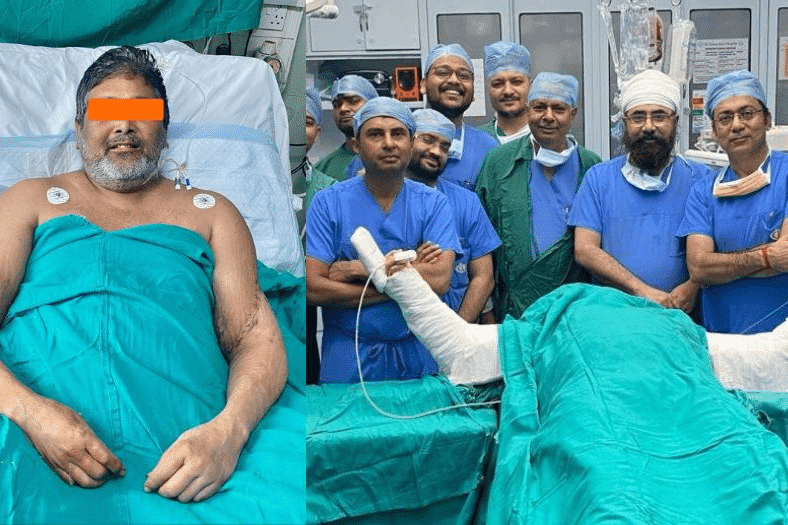In a pioneering medical procedure that marks a first for North India, Raj Kumar, a 45-year-old man from Delhi, has been given a new pair of arms in a groundbreaking bilateral arm transplant.
This monumental surgery signifies a leap in medical science and restores hope and mobility to an individual who has lost much.
A Beacon of Generosity
The arms were donated by Meena Mehta, a former administrative head of a South Delhi school. She had previously pledged to donate her organs. After being declared brain-dead, Meena’s commitment to organ donation turned into a legacy of life for Raj Kumar, among others who benefited from her generosity.
The Operation
The intricate surgery was performed by a team of 11 doctors at Sir Ganga Ram Hospital in Delhi. This mammoth operation lasted over 12 hours. It involved the meticulous connection of bones, arteries, veins, tendons, muscles, nerves, and skin from the donor’s arms to Raj. The success of such a complex procedure is a testament to the advances in transplant medicine and the skill of the medical team involved.
Raj Kumar’s Journey
Raj, a painter by profession, tragically lost both his arms in a train accident in 2020. His life, deeply affected by this incident, faced another hurdle when attempts to use prosthetic arms were unsuccessful. The failure of prosthetics to restore his functionality led him to seek an alternative that would allow him to regain his independence and return to a semblance of his former life.
Recovery and Hope
Dr. Swaroop Singh Gambhir, one of the surgeons involved in Raj’s operation, shared that Raj is recovering well and is expected to be discharged from the hospital. The successful transplantation brings more than just physical limbs to Raj. It also brings the possibility of returning to his craft, the ability to perform daily tasks independently, and, importantly, the restoration of his dignity.
The Challenge of Hand/Arm Transplantation
Hand transplantation, a type of composite tissue allotransplantation, involves transplanting a hand from a deceased donor to an amputee. The procedure aims to offer better functional and aesthetic outcomes compared to prosthetics. Despite the established microsurgical techniques, hand/arm transplantation is controversial due to the lifelong antirejection treatment required, which poses significant side effects.
Ethical and Financial Implications
The debate surrounding hand/arm transplantation encompasses ethical, financial, and psychological considerations. As a non-life-saving procedure that demands ongoing immunosuppression, the risk of serious side effects is a major concern. Further research is crucial to achieving immunological tolerance and minimising post-transplant therapy’s costs and potential adverse effects.
The Future of Transplant Medicine
Raj Kumar’s successful bilateral arm transplant paves the way for future operations of similar complexity. Additionally, it highlights the critical importance of organ donation. It showcases the remarkable possibilities in medical science. Consequently, losing a vital part of one’s body no longer signifies an end to functionality or independence.
This operation not only advances medical science in India. It also serves as a poignant reminder of organ donation’s profound impact on individuals’ lives. It reinforces the message that amid loss, there can be hope, and new life can emerge in the wake of death. Therefore, Raj Kumar’s story is one of resilience, medical innovation, and the enduring spirit of human generosity.
Photo credit: DD News

